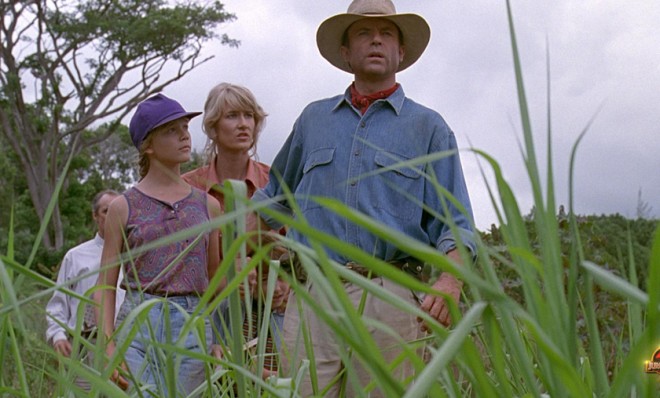How Jurassic World can save us from the age of superheroes
The long-awaited fourth movie in the Jurassic Park franchise could spark a return to form for summer blockbusters


A free daily email with the biggest news stories of the day – and the best features from TheWeek.com
You are now subscribed
Your newsletter sign-up was successful
On Tuesday, Steven Spielberg announced that the fourth Jurassic Park movie, Jurassic World, will hit theaters on June 12, 2015. The original Jurassic Park established the modern blockbuster landscape with its groundbreaking special effects, which pushed technology further than any other film released before that point.
But if Jurassic Park heralded a new era in summer blockbusters, the genre has gone off the rails in the years since, with this summer's crop offering high-profile disappointments like Star Trek Into Darkness and Man of Steel. The genre is badly in need of a course correction — and Jurassic World is exactly the movie to do it.
Of course, it's too early to say if Jurassic World will live up to its source material (and surpass Jurassic Park's first two disappointing sequels). We know practically nothing about Jurassic World, including which characters — if any — will return from the previous three films. We know that Steven Spielberg will produce, and that Safety Not Guaranteed director Colin Treverrow will direct from a screenplay he co-wrote with Derek Connolly. And we know, of course, that Jurassic World will be released in 3D.
The Week
Escape your echo chamber. Get the facts behind the news, plus analysis from multiple perspectives.

Sign up for The Week's Free Newsletters
From our morning news briefing to a weekly Good News Newsletter, get the best of The Week delivered directly to your inbox.
From our morning news briefing to a weekly Good News Newsletter, get the best of The Week delivered directly to your inbox.
But based on the first three films, there's one more thing we can probably infer about Jurassic World: Despite its grandiose title, it will be about regular people trying to survive a world full of dinosaurs. It might sound ridiculous to praise a 3D blockbuster about rampaging dinosaurs for its human qualities, but that is precisely what made Jurassic Park so appealing and what has been frustratingly absent from the summer blockbusters of recent years.
You probably won't be surprised to learn that there are already plenty of superhero movies scheduled to hit theaters in the summer of 2015. There's The Avengers: Age of Ultron (May 1), Batman vs. Superman (July 17), and Ant-Man (July 31). It's a summer blockbuster season that roughly echoes the pattern we saw this year, which included Iron Man 3 (May 3), Man of Steel (June 14), and The Wolverine (July 26). Some of those movies were better than others, but each is emblematic of Hollywood's recent obsession with superheroes, which has come at the cost of blockbusters about mere mortals.
Star Trek Into Darkness and World War Z screenwriter Damon Lindelof recently copped to his role in popularizing this trend. "We live in a commercial world, where you’ve gotta come up with 'trailer moments' and make the thing feel big and impressive and satisfying, especially in that summer-movie-theater construct," said Lindelof in an interview with New York earlier this year. "Once you spend more than $100 million on a movie, you have to save the world."
The end result? Even blockbusters that seem to be about people are essentially stories about superheroes. Non-superhero movies like Star Trek Into Darkness and Fast & Furious 6 have allowed superhero stories to seep into their DNA, taking franchises that were once about small, personal, and distinctly human conflicts to laughably outsized extremes. Even the Die Hard franchise — which was built on the concept of an everyman struggling to survive within a single building — has devolved into ludicrous sequels like this year's A Good Day to Die Hard, which completed the unfortunate transformation of Bruce Willis' John McClane into a superhero in everything but name only.
A free daily email with the biggest news stories of the day – and the best features from TheWeek.com
And that brings us back to Jurassic World, which is uniquely positioned to buck this homogenized, homogenizing trend. The original Jurassic Park is an action-adventure film, but there's a certain amount of horror in its DNA. Yes, there are dinosaurs — but in the end, Jurassic Park is a film about survival, featuring a group of regular people who are wholly unequipped to brave the hostile elements: Scientists, computer technicians, and kids.
Given Lindelof's warning about "saving the world," the title Jurassic World might evoke a little skepticism. (Let's hope JP's marketing team is just expanding the original park's reach, like Disneyland into Disney World.) But as Jurassic World enters production, its filmmakers should remember that a 3D-converted re-release of the original Jurassic Park earned more than $45 million at the box office this year — a number that's just a few million behind first-run yawners like Red 2, and ahead of expensive misfires like R.I.P.D.
There's a reason, 20 years after its release, that audiences flocked to Jurassic Park again. Let's just hope the team behind Jurassic World takes more from its success than the 3D.

Scott Meslow is the entertainment editor for TheWeek.com. He has written about film and television at publications including The Atlantic, POLITICO Magazine, and Vulture.
-
 Political cartoons for February 15
Political cartoons for February 15Cartoons Sunday's political cartoons include political ventriloquism, Europe in the middle, and more
-
 The broken water companies failing England and Wales
The broken water companies failing England and WalesExplainer With rising bills, deteriorating river health and a lack of investment, regulators face an uphill battle to stabilise the industry
-
 A thrilling foodie city in northern Japan
A thrilling foodie city in northern JapanThe Week Recommends The food scene here is ‘unspoilt’ and ‘fun’
